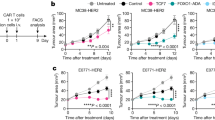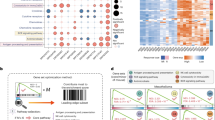Abstract
Glycogen synthase kinase 3 (GSK3) is a multifunctional serine/threonine kinase that participates in numerous signalling pathways involved in diverse physiological processes. Several of these pathways are implicated in disease pathogenesis, which has prompted efforts to develop GSK3-specific inhibitors for therapeutic applications. However, before now, there has been no strong rationale for targeting GSK3 in malignancies. Here we report pharmacological, physiological and genetic studies that demonstrate an oncogenic requirement for GSK3 in the maintenance of a specific subtype of poor prognosis human leukaemia, genetically defined by mutations of the MLL proto-oncogene. In contrast to its previously characterized roles in suppression of neoplasia-associated signalling pathways, GSK3 paradoxically supports MLL leukaemia cell proliferation and transformation by a mechanism that ultimately involves destabilization of the cyclin-dependent kinase inhibitor p27Kip1. Inhibition of GSK3 in a preclinical murine model of MLL leukaemia provides promising evidence of efficacy and earmarks GSK3 as a candidate cancer drug target.
This is a preview of subscription content, access via your institution
Access options
Subscribe to this journal
Receive 51 print issues and online access
$199.00 per year
only $3.90 per issue
Buy this article
- Purchase on Springer Link
- Instant access to full article PDF
Prices may be subject to local taxes which are calculated during checkout





Similar content being viewed by others
References
Doble, B. W. & Woodgett, J. R. GSK-3: tricks of the trade for a multi-tasking kinase. J. Cell Sci. 116, 1175–1186 (2003)
Kim, L. & Kimmel, A. R. GSK3 at the edge: regulation of developmental specification and cell polarization. Curr. Drug Targets 7, 1411–1419 (2006)
Cohen, P. & Frame, S. The renaissance of GSK3. Nature Rev. Mol. Cell Biol. 2, 769–776 (2001)
Fiol, C. J., Mahrenholz, A. M., Wang, Y., Roeske, R. W. & Roach, P. J. Formation of protein kinase recognition sites by covalent modification of the substrate. Molecular mechanism for the synergistic action of casein kinase II and glycogen synthase kinase 3. J. Biol. Chem. 262, 14042–14048 (1987)
Cross, D. A., Alessi, D. R., Cohen, P., Andjelkovich, M. & Hemmings, B. A. Inhibition of glycogen synthase kinase-3 by insulin mediated by protein kinase B. Nature 378, 785–789 (1995)
Kaidanovich, O. & Eldar-Finkelman, H. The role of glycogen synthase kinase-3 in insulin resistance and type 2 diabetes. Expert Opin. Ther. Targets 6, 555–561 (2002)
Hoeflich, K. P. et al. Requirement for glycogen synthase kinase-3β in cell survival and NF-κB activation. Nature 406, 86–90 (2000)
Martin, M., Rehani, K., Jope, R. S. & Michalek, S. M. Toll-like receptor-mediated cytokine production is differentially regulated by glycogen synthase kinase 3. Nature Immunol. 6, 777–784 (2005)
De Ferrari, G. V. & Inestrosa, N. C. Wnt signaling function in Alzheimer’s disease. Brain Res. Rev. 33, 1–12 (2000)
Miller, J. R. & Moon, R. T. Signal transduction through β-catenin and specification of cell fate during embryogenesis. Genes Dev. 10, 2527–2539 (1996)
Jia, J. et al. Shaggy/GSK3 antagonizes Hedgehog signalling by regulating Cubitus interruptus. Nature 416, 548–552 (2002)
Miller, J. R. The Wnts. Genome Biol 3, 3001 (2002)
Yost, C. et al. The axis-inducing activity, stability, and subcellular distribution of β-catenin is regulated in Xenopus embryos by glycogen synthase kinase 3. Genes Dev. 10, 1443–1454 (1996)
van Noort, M., Meeldijk, J., van der Zee, R., Destree, O. & Clevers, H. Wnt signaling controls the phosphorylation status of β-catenin. J. Biol. Chem. 277, 17901–17905 (2002)
Sears, R. et al. Multiple Ras-dependent phosphorylation pathways regulate Myc protein stability. Genes Dev. 14, 2501–2514 (2000)
Nikolakaki, E., Coffer, P. J., Hemelsoet, R., Woodgett, J. R. & Defize, L. H. Glycogen synthase kinase 3 phosphorylates Jun family members in vitro and negatively regulates their transactivating potential in intact cells. Oncogene 8, 833–840 (1993)
Trowbridge, J. J., Xenocostas, A., Moon, R. T. & Bhatia, M. Glycogen synthase kinase-3 is an in vivo regulator of hematopoietic stem cell repopulation. Nature Med. 12, 89–98 (2006)
Sato, N., Meijer, L., Skaltsounis, L., Greengard, P. & Brivanlou, A. H. Maintenance of pluripotency in human and mouse embryonic stem cells through activation of Wnt signaling by a pharmacological GSK-3-specific inhibitor. Nature Med. 10, 55–63 (2004)
Ayton, P. M. & Cleary, M. L. Molecular mechanisms of leukemogenesis mediated by MLL fusion proteins. Oncogene 20, 5695–5707 (2001)
Hess, J. L. MLL: a histone methyltransferase disrupted in leukemia. Trends Mol. Med. 10, 500–507 (2004)
Lavau, C., Szilvassy, S. J., Slany, R. & Cleary, M. L. Immortalization and leukemic transformation of a myelomonocytic precursor by retrovirally transduced HRX-ENL. EMBO J. 16, 4226–4237 (1997)
Somervaille, T. C. & Cleary, M. L. Identification and characterization of leukemia stem cells in murine MLL-AF9 acute myeloid leukemia. Cancer Cell 10, 257–268 (2006)
Watase, K. et al. Lithium therapy improves neurological function and hippocampal dendritic arborization in a spinocerebellar ataxia type 1 mouse model. PLoS Med. 4, e182 (2007)
Polakis, P. The oncogenic activation of beta-catenin. Curr. Opin. Genet. Dev. 9, 15–21 (1999)
Testa, J. R. & Tsichlis, P. N. AKT signaling in normal and malignant cells. Oncogene 24, 7391–7393 (2005)
Nickeleit, I., Zender, S., Kossatz, U. & Malek, N. P. p27kip1: a target for tumor therapies? Cell Div. 2, 13 (2007)
Milne, T. A. et al. Menin and MLL cooperatively regulate expression of cyclin-dependent kinase inhibitors. Proc. Natl Acad. Sci. USA 102, 749–754 (2005)
Yokoyama, A. et al. The menin tumor suppressor protein is an essential oncogenic cofactor for MLL-associated leukemogenesis. Cell 123, 207–218 (2005)
Hughes, C. M. et al. Menin associates with a trithorax family histone methyltransferase complex and with the Hoxc8 locus. Mol. Cell 13, 587–597 (2004)
Xia, Z. B. et al. The MLL fusion gene, MLL–AF4, regulates cyclin-dependent kinase inhibitor CDKN1B (p27kip1) expression. Proc. Natl Acad. Sci. USA 102, 14028–14033 (2005)
Surjit, M. & Lal, S. K. Glycogen synthase kinase-3 phosphorylates and regulates the stability of p27kip1 protein. Cell Cycle 6, 580–588 (2007)
G.-Amlak, M. et al. Regulation of myeloma cell growth through Akt/Gsk3/forkhead signaling pathway. Biochem. Biophys. Res. Commun. 297, 760–764 (2002)
Dimartino, J. F. & Cleary, M. L. Mll rearrangements in haematological malignancies: lessons from clinical and biological studies. Br. J. Haematol. 106, 614–626 (1999)
Chen, C. S. et al. Molecular rearrangements on chromosome 11q23 predominate in infant acute lymphoblastic leukemia and are associated with specific biologic variables and poor outcome. Blood 81, 2386–2393 (1993)
Gould, T. D. & Manji, H. K. The Wnt signaling pathway in bipolar disorder. Neuroscientist 8, 497–511 (2002)
Yilmaz, O. H. et al. Pten dependence distinguishes haematopoietic stem cells from leukaemia-initiating cells. Nature 441, 475–482 (2006)
Smith, K. S., Rhee, J. W. & Cleary, M. L. Transformation of bone marrow B-cell progenitors by E2A-HlF requires coexpression of BCL-2. Mol. Cell. Biol. 22, 7678–7687 (2002)
So, C. W. et al. MLL-GAS7 transforms multipotent hematopoietic progenitors and induces mixed lineage leukemias in mice. Cancer Cell 3, 161–171 (2003)
Smith, K. S., Jacobs, Y., Chang, C. P. & Cleary, M. L. Chimeric oncoprotein E2a-Pbx1 induces apoptosis of hematopoietic cells by a p53-independent mechanism that is suppressed by Bcl-2. Oncogene 14, 2917–2926 (1997)
Kasper, L. H. et al. CREB binding protein interacts with nucleoporin-specific FG repeats that activate transcription and mediate NUP98-HOXA9 oncogenicity. Mol. Cell. Biol. 19, 764–776 (1999)
Kohn, A. D. et al. Construction and characterization of a conditionally active version of the serine/threonine kinase Akt. J. Biol. Chem. 273, 11937–11943 (1998)
So, C. W. & Cleary, M. L. MLL-AFX requires the transcriptional effector domains of AFX to transform myeloid progenitors and transdominantly interfere with forkhead protein function. Mol. Cell. Biol. 22, 6542–6552 (2002)
Ventura, A. et al. Cre-lox-regulated conditional RNA interference from transgenes. Proc. Natl Acad. Sci. USA 101, 10380–10385 (2004)
Acknowledgements
We thank R. Roth for providing AKT constructs, P. J. Roach for providing GSK3 constructs, D. G. Gilliland for providing a TEL-AML1 construct, M. Iwasaki for NUP98-HOXA9 cells, M. Ambrus and C. Nicolas for technical assistance, and members of the Cleary laboratory for discussions. We acknowledge support from the Children’s Health Initiative of the Packard Foundation, PHS grants CA55029 and CA116606, the Leukemia and Lymphoma Society, the Williams Lawrence Foundation and a Developmental Research Award from the Stanford Cancer Center.
Author information
Authors and Affiliations
Corresponding author
Supplementary information
Supplementary Information
This file contains Supplementary Figures and Legends 1-8 and Supplementary Tables 1-3. (PDF 1483 kb)
Rights and permissions
About this article
Cite this article
Wang, Z., Smith, K., Murphy, M. et al. Glycogen synthase kinase 3 in MLL leukaemia maintenance and targeted therapy. Nature 455, 1205–1209 (2008). https://doi.org/10.1038/nature07284
Received:
Accepted:
Published:
Issue Date:
DOI: https://doi.org/10.1038/nature07284
This article is cited by
-
GSK-3: a multifaceted player in acute leukemias
Leukemia (2021)
-
GLI1 reduces drug sensitivity by regulating cell cycle through PI3K/AKT/GSK3/CDK pathway in acute myeloid leukemia
Cell Death & Disease (2021)
-
MBNL1 regulates essential alternative RNA splicing patterns in MLL-rearranged leukemia
Nature Communications (2020)
-
Transient stabilization, rather than inhibition, of MYC amplifies extrinsic apoptosis and therapeutic responses in refractory B-cell lymphoma
Leukemia (2019)
-
Creatine kinase pathway inhibition alters GSK3 and WNT signaling in EVI1-positive AML
Leukemia (2019)
Comments
By submitting a comment you agree to abide by our Terms and Community Guidelines. If you find something abusive or that does not comply with our terms or guidelines please flag it as inappropriate.



